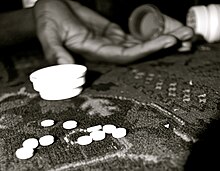Risky sexual behavior: Difference between revisions
new page |
(No difference)
|
Revision as of 22:08, 20 March 2017
Risky sexual behavior is the description of the activity that will increase the probability of an individual being exposed to a person who is infected with a sexually transmitted disease.[1] Risky sexual behavior includes unprotected intercourse, multiple sex partners, and illicit drug use.[2] The use of alcohol and illicit drugs greatly decreases the risk of gonorrhea, chlamydia, trichomoniasis, hepatitis B, and HIV/AIDS.
Engaging in risky sexual behavior is non-consensual and is related to age (children) and nationality. Children in Botswana, Cameroon, Democratic Republic of Congo, Egypt, Ethiopia, Ghana, Kenya, Nigeria, Rwanda, Senegal, South Africa, Sudan, Tanzania, Tunisia, Uganda and Zimbabwe have been forced to have sex which has resulted in having poorer health when compared to children from other countries.[3]

Interventions
Sexual health risk reduction can include motivational exercises, assertiveness skills, educational and behavioral interventions, and counselling developed and implemented for people with severe mental illness, may improve participants' knowledge, attitudes, beliefs behaviors or practices (including assertiveness skills) and could lead to a reduction in risky sexual behavior.[2][2]
Refernces
- ^ Dimbuene, Zacharie Tsala; Emina, Jacques B.O.; Sankoh, Osman (2014). "UNAIDS 'multiple sexual partners' core indicator: promoting sexual networks to reduce potential biases". Global Health Action. 7 (1): 23103. doi:10.3402/gha.v7.23103. ISSN 1654-9716.
- ^ a b c Pandor, Abdullah; Kaltenthaler, Eva; Higgins, Agnes; Lorimer, Karen; Smith, Shubulade; Wylie, Kevan; Wong, Ruth (2015). "Sexual health risk reduction interventions for people with severe mental illness: a systematic review". BMC Public Health. 15 (1). doi:10.1186/s12889-015-1448-4. ISSN 1471-2458.
{{cite journal}}: CS1 maint: unflagged free DOI (link) - ^ Cumber, Samuel Nambile; Tsoka-Gwegweni, Joyce Mahlako (2016). "The health profile of street children in Africa: a literature review". Journal of Public Health in Africa. 6 (2). doi:10.4081/jphia.2015.566. ISSN 2038-9930.
